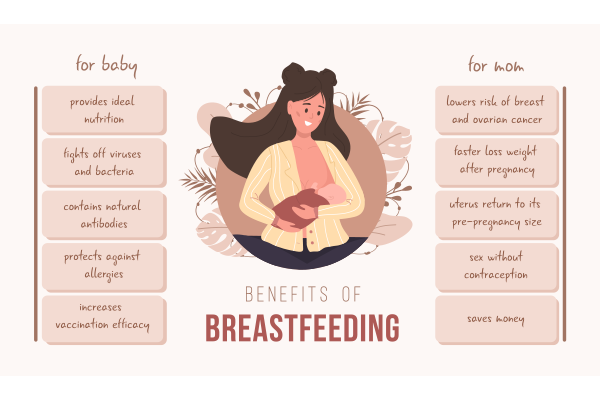
Breastfeeding is more than just nourishing your baby; it’s a natural process that offers lifelong benefits for both mother and child. It is not just a bonding experience—it’s a health investment that pays dividends for years to come. Scientific studies have consistently shown that breastfeeding boosts the baby’s immune system, aids in healthy brain development, and protects mothers from various long-term health issues. The unique properties of breast milk provide dynamic, tailor-made nutrition that no formula can replicate.
For mothers, breastfeeding offers an opportunity to foster emotional bonding with their baby while also reducing the risk of postpartum depression, cancer, and osteoporosis. For babies, breast milk provides all the nutrients they need for the first six months of life, setting the stage for healthy growth and development. This blog explores the science behind breastfeeding and its role in giving your baby the healthiest possible start.
Synopsis
Advantages of Breastfeeding Over Bottle Feeding
Breastfeeding provides a unique combination of nutrients that formula cannot replicate. The advantages go beyond simple nutrition, offering a wide array of health benefits for both babies and mothers.
|
Benefit |
Breastfeeding |
Formula Feeding |
|
Immune System Support |
Contains antibodies to fight infections |
Lacks immune-boosting antibodies |
|
Brain Development |
High in DHA, promoting cognitive and visual development |
May contain added DHA but is not as effective |
|
Emotional Bonding |
Enhances bonding through skin-to-skin contact |
Less skin-to-skin contact |
|
Chronic Illness Risk |
Reduces risk of asthma, allergies, and diabetes |
Higher likelihood of developing chronic conditions |
For personalized guidance on breastfeeding and infant care, consider visiting Manipal Hospitals Ghaziabad. Their specialists provide compassionate and evidence-based care to support mothers on their breastfeeding journey.
Benefits Beyond Nutrition

Breastfeeding offers benefits that extend beyond physical nutrition for both mother and baby.
|
Maternal Health Benefit |
Description |
|
Postpartum Depression Reduction |
Oxytocin release reduces stress and improves mental well-being |
|
Cancer Risk Reduction |
Lowers risk of breast and ovarian cancer |
|
Weight Management |
Helps mothers return to pre-pregnancy weight faster |
|
Bone Health |
May improve bone density and reduce osteoporosis risk |
Breastfeeding Myths and Misconceptions
Despite its many advantages, breastfeeding is surrounded by myths that may discourage mothers from pursuing it.
-
Myth 1: Breastfeeding is always painful. While some discomfort is normal at the beginning, persistent pain indicates a possible issue that can often be resolved with proper latch techniques.
-
Myth 2: Formula is just as good. While the formula is a nutritious alternative, it lacks the antibodies and dynamic properties of breast milk.
-
Myth 3: You can’t breastfeed while sick. In most cases, breastfeeding while sick is safe and beneficial, as breast milk contains antibodies to help protect the baby.
Breastfeeding and Nutrition: What Should Mothers Eat?
A well-balanced diet is essential for breastfeeding mothers to ensure both their health and the baby’s optimal growth.
-
Protein: Essential for tissue repair and milk production. Good sources include lean meats, fish, eggs, and legumes.
-
Healthy fats: Include foods rich in omega-3 fatty acids like salmon, walnuts, and chia seeds.
-
Fruits and vegetables: These provide essential vitamins and antioxidants.
-
Hydration: Drinking plenty of water is crucial for milk production.
Practical Tips for Successful Breastfeeding
To ensure a positive breastfeeding experience, consider the following tips:

-
Seek support early: Consult lactation consultants or join breastfeeding support groups.
-
Learn proper latch techniques: A good latch minimizes discomfort and ensures adequate milk flow.
-
Feed on demand: Let your baby’s hunger cues dictate feeding times rather than adhering to a strict schedule.
-
Rest and self-care: Adequate sleep and stress management play a critical role in successful breastfeeding.
Conclusion
Breastfeeding is a powerful way to give your baby the best start in life. From strengthening the immune system to fostering emotional bonding and improving maternal health, its benefits are undeniable. If you’re considering breastfeeding, equip yourself with knowledge, seek support when needed, and remember that every effort you make contributes to your baby’s lifelong health and happiness.
For expert advice on breastfeeding or maternal care, contact the Obstetrics and Gynecology Department at Manipal Hospitals Ghaziabad. Visit our speciality page or contact us here for more information and personalized care options.
FAQ's
The World Health Organization (WHO) recommends exclusive breastfeeding for the first six months, followed by continued breastfeeding with complementary foods for up to two years or beyond.
Signs that your baby is feeding well include regular wet and dirty diapers, steady weight gain, and periods of contentment after feeding.
Most medications are safe to take while breastfeeding, but always consult your doctor before starting any new medication.
Pain is often caused by improper latch or positioning. Seek help from a lactation consultant or healthcare provider if pain persists.
Yes, any amount of breastfeeding is beneficial. Even partial breastfeeding provides your baby with essential nutrients and antibodies.



















 4 Min Read
4 Min Read













